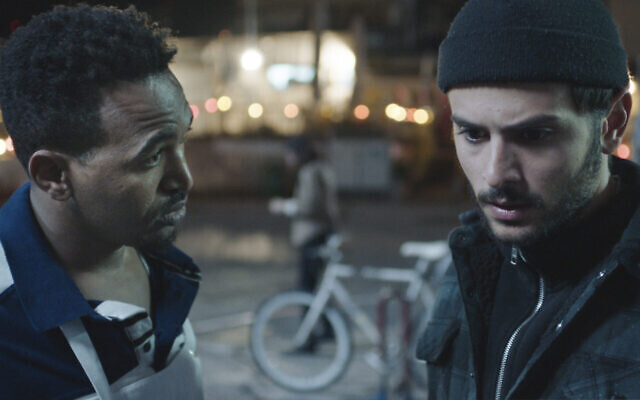An Israeli film examining the lives of African migrants in the country was nominated Monday for an Oscar in the Best Live Action Short Film category, after being selected from a shortlist of ten films.
“White Eye,” by 33-year-old director Tomer Shushan, tackles an Israeli problem familiar to Americans: Explicit or subliminal prejudice by much of the population and police against non-white residents, especially migrants.
Lead actor Daniel Gad told Channel 12 news Monday that the nomination was a “huge joy.”
However, Gad said he doesn’t believe he will make it to the ceremony.
The 93rd Academy Awards ceremony, known as the Oscars and widely considered the most prestigious in the movie industry, will take place at the Dolby Theatre in Hollywood, Los Angeles, California, on April 25.
Culture and Sports Minister Chili Tropper congratulated the nominees in a statement, saying the nomination was “full of local pride” and showed the quality of the Israeli culture industry.
Shot in one take — after numerous rehearsals — during one night in a squalid quarter of Tel Aviv, the protagonist of the 20-minute film is Omer (Gad), a light-skinned middle-class native Israeli. In the opening, he spots a bicycle that had been recently stolen from him during a beach outing. While he tries to repossess the bike by sawing off its lock, Yunes, a black Eritrean immigrant taking a break from his job in a nearby meat packaging plant, spots Omer and claims that he owns the bicycle and had bought it for 250 shekels ($75).
Omer calls the police and two officers — one wearing a kippah — discover that Yunes (Dawit Tekelaeb) has overstayed his visa. That means that he, his wife and child are likely to be deported to their strife-torn native land.
Suffering twinges of conscience, Omer walks over to a nearby ATM and withdraws 250 shekels, then hands the cash to Yunes.
The final scene — featuring a twist — is based on Shushan’s personal experience.
In a recent phone interview, the director said he chose the film’s title as an allusion to “white eye” as an affliction of blind people and implies that many of his fellow Israelis are blind to the racial bias in their country.
“Though less intensive than in the United States,” he observed, there is considerable prejudice in Israel, notably among the police, against dark-skinned residents and immigrants.
There are some 70,000 to 80,000 Eritreans and Sudanese asylum seekers in Israel, according to Shushan and government statistics. Half live in the Tel Aviv area.
Shushan, a descendant of Moroccan Jews, said he had experienced prejudice, though less so in liberal Tel Aviv than in Jerusalem.
Harking back to his own experience paralleling the film, Shushan recalled that he felt sorry for the alleged thief, asked the police to go away, gave 250 shekels to the immigrant and took back the bicycle. However, the immigrant continued to cry, saying he was afraid the police would return and that everybody was against him.
By that time, Shushan said, he “didn’t like the bicycle anymore” and consigned it to the fate illustrated in the finale of the film.
A graduate of Tel Aviv’s Minshar School of Art, Shushan wrote the film in one hour as he was still reeling from the incident.
“White Eye” is Shushan’s second short, following his first student film, and he is currently developing a TV series, “Torso,” about a private investigator, as well as his first feature film, “Between the Sacred and The Secular.”
The total cost of the film came to $34,000 — loose change by Hollywood standards — of which 90 percent was covered by the government-backed Makor Foundation. Shushan is now trying to raise funds for a feature film on a similar theme to be titled “Between Sand Grains.”






